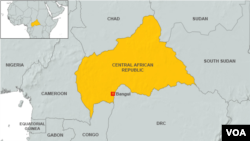The United Nations' top human rights official says he is "deeply concerned" that no action has been taken over allegations that African Union peacekeepers killed 11 people in the Central African Republic last year.
Zeid Ra'ad Al Hussein said Friday that a full and transparent investigation has not been conducted by responsible authorities either inside or outside the country.
The United Nations says the incident took place in a small town north of the capital, Bangui, when 11 people were arrested by peacekeeping troops from the Republic of Congo after an exchange of fire with an armed group. The 11, including five women and one child, were detained at a Congolese peacekeeping base in March 2014 and were not heard from again.
Witnesses at the base reported hearing screaming and gunshots after the detainees were brought there, and later saw vehicles travel to a nearby facility. The witnesses say Congolese soldiers declared the facility off limits for weeks afterward, warning there might be land mines in the area.
Other sources said they believed the detainees were buried in the area.
"Upon visiting the area, human rights staff noticed visible undulation in the land, supporting the contention that the land was disturbed at one point," said Hussein.
The Office of the High Commissioner for Human Rights says the Congolese troops may have carried out serious human rights violations, including acts of torture and extrajudicial killings. The agency is sending a team from Geneva to investigate, and is urging the African Union, the Republic of Congo, and the government of CAR to carry out their own investigations.
Officials noted that African peacekeepers have been invaluable in stopping the worst of the fighting in CAR and said their presence has saved a large number of lives. They said, however, that in some cases, including this one, the troops "have seriously breached international human rights law."
Central African Republic was hit by unprecedented sectarian violence more than a year ago when the Christian anti-Balaka militia was formed to combat the mostly Muslim Seleka rebels, who had taken control of the country.




